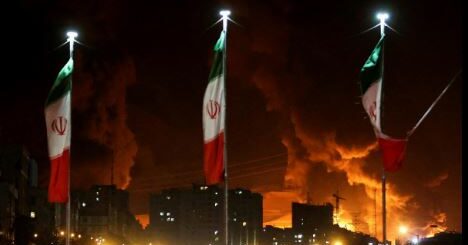Iran Fires Cluster Bomb-Bearing Missiles at Israel as Conflict Enters 8th Day
Iran Launches Cluster Bomb Missiles at Israel: Conflict Escalates on Day 8

Tel Aviv, June 20, 2025 – Tensions in the Middle East escalated further today as Iran launched a barrage of cluster bomb-bearing missiles targeting Israeli territory, marking a dangerous new phase in the ongoing conflict, now in its eighth day. The Israeli Defense Forces (IDF) confirmed that at least three missiles struck residential areas in central Israel, causing significant property damage but no reported fatalities.
The missiles, identified by Israeli military officials as carrying cluster munitions, scattered small explosive devices over a wide area near the town of Ramla. One home sustained moderate damage, with windows shattered and debris scattered across the property. Emergency response teams were deployed to assess the situation and ensure resident safety. The IDF has heightened its alert status, anticipating further attacks.
Cluster munitions, which release smaller bomblets designed to maximize destruction, have been widely criticized for their indiscriminate nature. Neither Iran nor Israel is a signatory to the 2008 Convention on Cluster Munitions, which bans their use due to the high risk of civilian harm. The deployment of such weapons has raised concerns among international observers about the potential for increased civilian casualties as the conflict intensifies.
The latest attacks follow a week of escalating hostilities, sparked by a series of tit-for-tat strikes between Iran and Israel. The conflict began after an alleged Israeli airstrike on an Iranian military facility near Tehran, which Iran claims killed several high-ranking officers. Iran retaliated with missile strikes on Israeli military targets, prompting further Israeli counterstrikes.
“We condemn the use of cluster munitions in the strongest terms,” said a spokesperson for the European Union’s foreign affairs office in a statement issued today. “All parties must prioritize the protection of civilians and adhere to international humanitarian law.”
Iran’s Foreign Ministry defended its actions, stating that the missile strikes were a “necessary response to Israeli aggression” and aimed at military targets. Meanwhile, Israeli Prime Minister Yossi Cohen vowed a “swift and decisive” response, emphasizing that Israel would not tolerate attacks on its soil.
As the conflict enters its second week, the humanitarian toll is mounting. Thousands of residents in affected areas have sought shelter, and local authorities report strained resources in responding to the crisis. The international community remains divided on how to address the situation, with diplomatic efforts so far failing to secure a ceasefire.
Analysts warn that the use of cluster munitions could signal a dangerous escalation, potentially drawing in other regional actors. “This is a volatile situation that risks spiraling further out of control,” said Dr. Amira Khalil, a Middle East security expert at the Global Conflict Analysis Institute. “Both sides appear entrenched, and the introduction of controversial weapons like cluster bombs only heightens the stakes.”
The IDF has urged residents in central and southern Israel to remain vigilant and follow safety protocols. Air raid sirens echoed across Tel Aviv and surrounding areas this morning, a stark reminder of the ongoing threat. As night falls, the region braces for what may come next in this increasingly unpredictable conflict.

